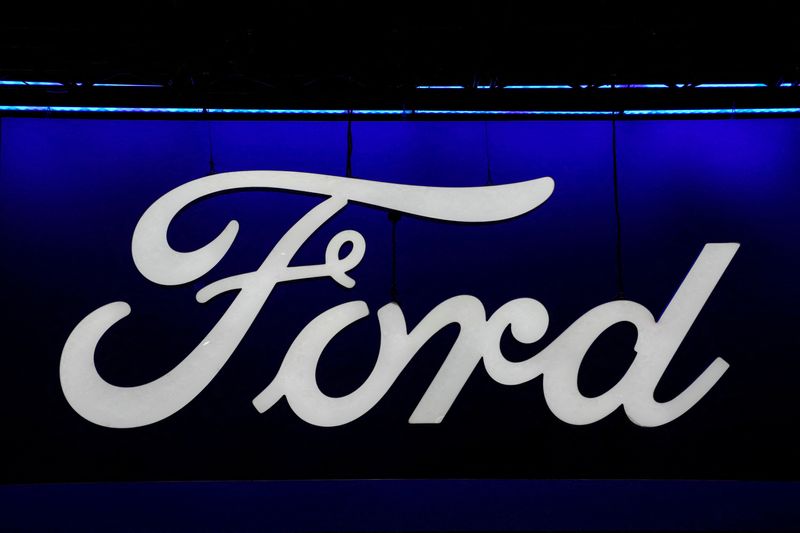By Nora Eckert
DETROIT (Reuters) - At a packed investor day in Dearborn, Michigan, last year, Ford Motor (NYSE:F) executives lauded their forthcoming three-row electric SUV, which they said would be rolling off assembly lines in 2025.
"We call it a personal bullet train. It's beautiful and it's unlike anything in the segment so far," Doug Field, Ford's head of EVs, and a former executive at Apple (NASDAQ:AAPL) and Tesla (NASDAQ:TSLA), said at the May 2023 event.
Fifteen months later, the personal bullet train was officially derailed on Wednesday as the U.S. automaker killed it before it even launched, a sign of the industry's deepening retrenchment on EVs as consumers have been slower than anticipated to jump on board battery-powered technology.
"The reality is that the market changed," Marin Gjaja, Ford's chief operating officer for its EV division, told Reuters on Thursday. "As we saw the growth and adoption rate fade, we were furiously trying to catch up."
Ford executives said they would instead focus on hybrid three-row SUVs, one of the most prominent EV product pivots to date - and one that could cost the company up to $1.9 billion.
Removing a significant vehicle from Ford's EV future, one that executives had promised would differentiate the company in a crowded field, also means leaders will have to refresh their pitch to investors about how they will turn around the automaker's slumping stock.
"You've been in that box with all of us and it's now time to break out," Ford CEO Jim Farley told investors during the May 2023 event, referring to the company's stock valuation, after touting the three-row SUV. Ford shares have fallen 25% from their July peak this year, and are down about 5% from the 2023 investor day.
But Gjaja said Ford's pivot is a sign the company is making the hard decisions necessary to produce profitable EVs, something he said is a challenge even for EV giants like Tesla.
"The real question here is, how do we create enough scale with the right products, with the right features and offerings that can get us to a scale level where we can be profitable on both the vehicle side and on the software services," Gjaja said.
On Wednesday, Ford also said it planned to push back another much-anticipated vehicle, the new electric version of its F-150 truck, until 2027, two years after it was initially intended to launch. It said it will add an electric van to its future lineup as it doubles down on its strengths: pickup trucks and commercial vehicles.
Ford will provide an update on its EV plans in the first half of 2025.
Some industry observers wondered why it took the automaker so long to switch gears.
"The criticism Ford will have to face is why its product plan was not more flexible from the beginning, why it has been slow to implement these changes, and why investors will need to wait for a comprehensive update until next year," Bernstein analyst Daniel Roeska said in a research note.
'STARTING TO SEE THE FRUITS'
With the EV truck delayed, the three-row SUV killed and Ford facing EV losses of up to $5.5 billion this year, investors are eagerly awaiting Ford's affordable EVs from its "skunkworks" team, made up of more than 100 engineers and software specialists based in California.
Farley has said he is staking the company's future on this group's success. The first such product will be a midsized electric pickup, Ford said Wednesday.
"The progress they've made in two years is nothing short of breathtaking, and we're starting to see the fruits of that," Gjaja said. Still, buyers will have to wait more than two years before that model rolls off assembly lines.
Ford's decision to shift into building three-row hybrid SUVs, instead of EVs, is providing some reassurance to analysts about its near-term strategy. The automaker and many rivals are increasingly leaning in to hybrid technology that combines an electric motor with a gasoline-powered engine as a bridge to EVs, and Farley has said hybrids will likely be a significant part of Ford’s portfolio in the future.
The $1.9 billion hit on the cancellation of the three-row SUV will sting, but many analysts said Ford ultimately made the right call.

"There's no sense making what's potentially already going to be a $1.9 billion hit an even bigger number by sticking with the vehicle even though you know you don't have a path to profitability with it," Morningstar analyst David Whiston said.
Still, Ford's crosstown rival General Motors (NYSE:GM) is standing by plans to begin production of an electric three-row SUV this year - the Cadillac Escalade IQ, which Whiston said is a result of GM's earlier start into building ground-up EVs.